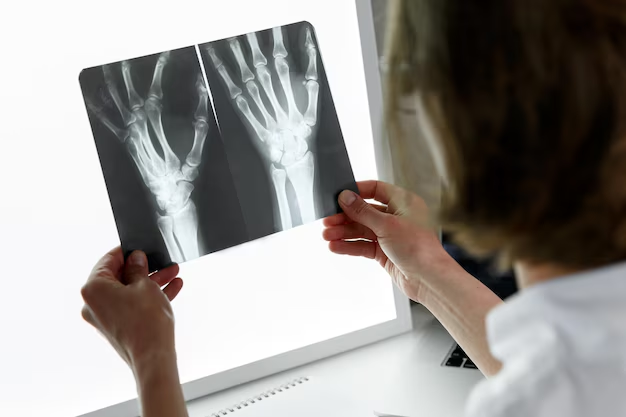Your Guide to How To Know If You Have Osteoporosis
What You Get:
Free Guide
Free, helpful information about Osteoporosis FAQ and related How To Know If You Have Osteoporosis topics.
Helpful Information
Get clear and easy-to-understand details about How To Know If You Have Osteoporosis topics and resources.
Personalized Offers
Answer a few optional questions to receive offers or information related to Osteoporosis FAQ. The survey is optional and not required to access your free guide.
Spotting Osteoporosis: Here's What You Need to Know
As we age, maintaining bone health becomes increasingly vital, but distinguishing natural aging from potential osteoporosis can be tricky. Osteoporosis, a condition that causes bones to become weak and brittle, often goes unnoticed until a fracture occurs. However, identifying the warning signs and seeking appropriate testing can help you manage and potentially mitigate the effects of this condition.
Recognizing the Symptoms of Osteoporosis
Osteoporosis is sometimes called a "silent disease" because of its elusive nature. However, there are some signs you can look out for:
- Frequent Fractures: If you experience fractures, especially in the hip, wrist, or spine, from minor incidents, it could indicate brittle bones.
- Height Loss: A loss in height over time could suggest spine compression fractures, a common indicator of osteoporosis.
- Back Pain: Chronic back pain might not just be from muscle strain; compressed or fractured vertebrae need to be considered.
- Posture Changes: A noticeable stoop or curved upper back could result from weakened spine bones due to osteoporosis.
Getting Tested
If you suspect you might have osteoporosis, it's crucial to seek confirmation through testing. The most common test is a DEXA scan (Dual-Energy X-ray Absorptiometry), a painless procedure that measures bone density. Discuss with your healthcare provider if this test is appropriate for you, especially if you are over 50 or have risk factors such as family history, low body weight, or lifestyle habits that affect calcium and vitamin D intake.
Proactive Prevention and Management
Even if you're diagnosed with osteoporosis, remember it's not the end of the road. Here’s what you can do:
- Supplements and Diet: Ensure adequate calcium and vitamin D intake through foods or supplements.
- Exercise: Weight-bearing and resistance exercises can help maintain bone density.
- Medications: Prescriptions such as bisphosphonates can help slow bone loss.
- Lifestyle Adjustments: Quit smoking and reduce alcohol consumption to support bone health.
Exploring Financial Resources for Health Management
Managing osteoporosis can be financially demanding, especially with ongoing medication, regular testing, and preventive measures. Fortunately, there are various programs and resources available to alleviate these concerns:
- Medicare and Medicaid: If you are eligible, these programs provide coverage for bone density tests and certain treatments.
- Insurance Coverage: Check your policy for osteoporosis-related services, including medications and physiotherapy.
- Government Assistance Programs: Explore options like Supplemental Security Income (SSI) if osteoporosis impacts your ability to work.
- Non-Profit Organizations: Many organizations offer grants and financial aid to those struggling to manage their health expenses.
Boosting Educational and Financial Opportunities
Consider pursuing educational programs that can help you manage your health better or offer support if your condition affects your professional life.
- Educational Grants: Scholarships and grants for further training or health management education can reduce career impacts.
To sum up, osteoporosis doesn't have to control your life. Early detection and proactive management can help maintain quality of life, and with the right financial strategies, managing treatment becomes more feasible.
Accessible Resources and Supports for Managing Osteoporosis 💪
- 🏥 Medicare/Medicaid: Coverage for testing and treatment.
- 💊 Insurance Plans: Check for osteoporosis-related services.
- 🏛️ Government Programs: SSI benefits for work-impacting conditions.
- 🤝 Non-Profit Aid: Financial support for medical expenses.
- 🎓 Educational Grants: Scholarships for further education.
What You Get:
Free Osteoporosis FAQ Guide
Free, helpful information about How To Know If You Have Osteoporosis and related resources.

Helpful Information
Get clear, easy-to-understand details about How To Know If You Have Osteoporosis topics.

Optional Personalized Offers
Answer a few optional questions to see offers or information related to Osteoporosis FAQ. Participation is not required to get your free guide.


Discover More
- a Nurse Is Caring For a Client Who Has Osteoporosis.
- a Percutaneous Is Performed To Treat Osteoporosis Related Compression Fractures
- Can Alcohol Cause Osteoporosis
- Can I Do Pilates If I Have Osteoporosis
- Can I Reverse Osteoporosis
- Can Men Get Osteoporosis
- Can Osteoporosis Affect Teeth
- Can Osteoporosis Be Cured
- Can Osteoporosis Be Painful
- Can Osteoporosis Be Reversed
